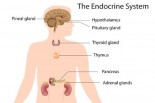Search Podcasts
Tuesday, 12 February 2019 00:00
EP 929B - Are Dangerous Chemicals Lurking in Your Home?
In his book, Sicker, Fatter, Poorer, Dr. Leonardo Trasande exposes the dangers of endocrine-disrupting chemicals.
Published in
YOU The Owners Manual Podcast
Friday, 16 November 2018 00:00
Endocrine Disruptors
Published in
Wellness for Life
Wednesday, 05 July 2017 00:00
Encore Episode: Neuroendocrine Tumors (NET): Living with Cancer
Published in
Code Delicious with Dr. Mike
Wednesday, 05 October 2016 06:00
Neuroendocrine Tumors (NET): Living with Cancer
Published in
Code Delicious with Dr. Mike
Tuesday, 05 January 2016 10:36
Avoid Endocrine Disruptors with Natural Nail Polish Options
Published in
Mindful Medicine
Tuesday, 01 September 2015 11:34
Endocrine Disruptors: The Hidden Threat to Your Health
Published in
Mindful Medicine





